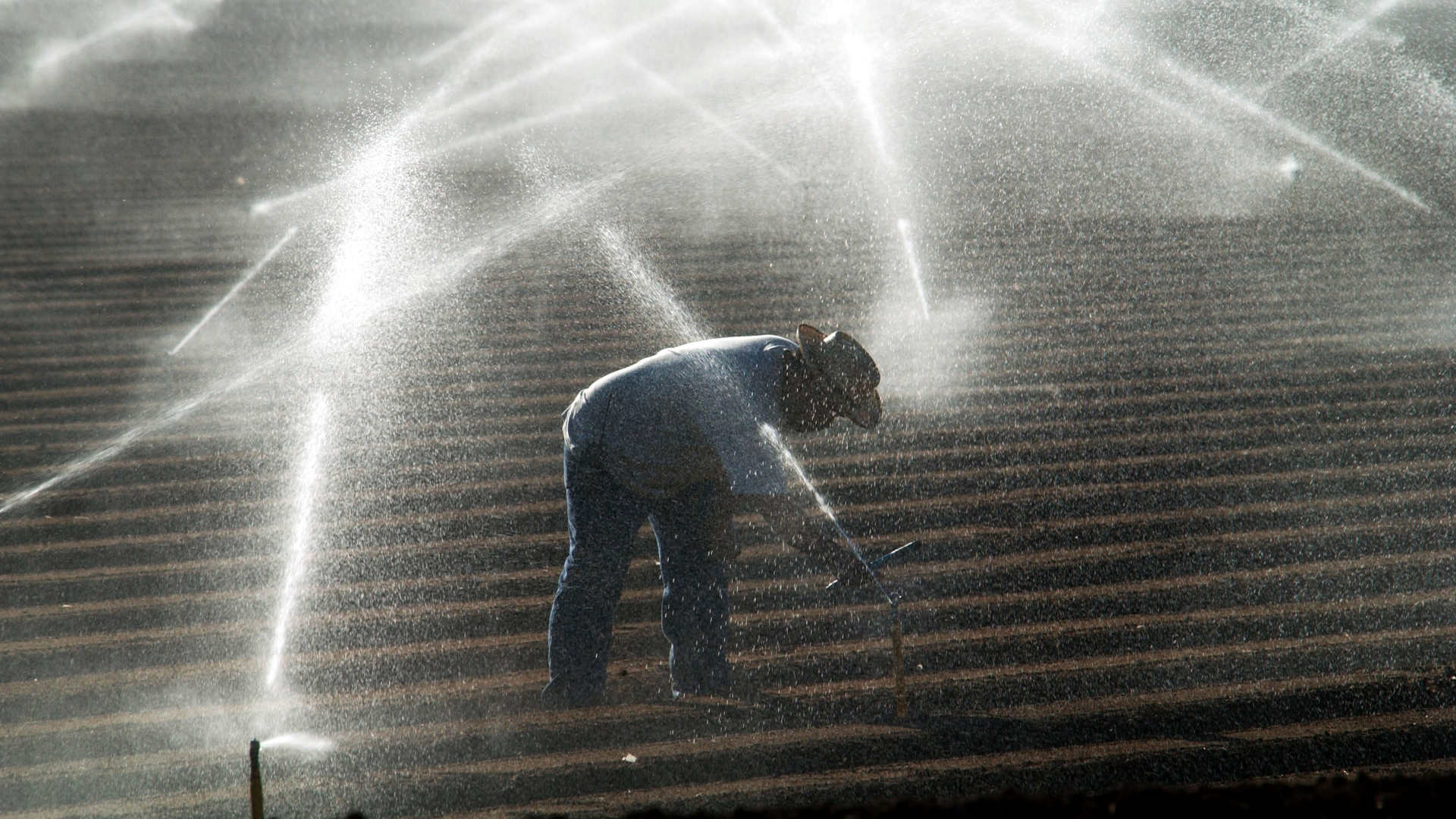U.S. Southwest, Already Parched, Sees 'Virtual Water' Drain AbroadAs the Colorado River Basin enters yet another year of drought, global compani...
Published on by Water Network Research, Official research team of The Water Network

As the Colorado River Basin enters yet another year of drought, global companies are worsening the water crisis.
Top: A farm worker adjusts sprinkler heads spraying water that comes from the Colorado River near El Centro, California. Visual: David McNew / Getty Images
BY DIANA KRUZMAN
05.31.2021
0 COMMENTS
DRIVING INTO SOUTHERN California’s Palo Verde Valley from the Arizona border, fields of vibrant green appear out of the desert like a mirage. Near the town of Blythe, water from the Colorado River turns the dry earth into verdant farmland, much of it to grow a single crop — alfalfa, a type of plant used mainly to feed dairy cows.
For decades, a significant portion of alfalfa grown here and elsewhere in the western United States — as much as 17 percent in 2017 — has been loaded onto trucks, driven hundreds of miles to ports on the west coast, and shipped around the world, mainly to China, Japan, and Saudi Arabia. A little over five years ago, one company decided it made more sense to own the land, and the water that came with it, outright.
The company, a Saudi Arabian dairy firm called Almarai, purchased 1,790 acres in the Palo Verde Valley to secure a supply of alfalfa for its dairy cows. Soon after, Saudi Arabia began phasing out domestic alfalfa production to preserve its water supplies, which were dwindling after years of overuse for agriculture. The purchase made headlines as critics including local politicians and environmentalists questioned whether it was fair for a foreign entity to use up valuable groundwater resources for products that wouldn’t ultimately benefit Americans.
The farms of the Palo Verde Valley draw water from the Colorado River.
Visual: Dicklyon / Wikimedia Commons
But the company is far from alone. Foreign corporations are increasingly purchasing land in the U.S.; in the Southwest, thanks to longstanding laws on water rights, these purchases often come with unlimited access to the valuable water underneath the soil. Combined with nearly year-round sunshine, this has made the area a magnet for companies looking to grow water-intensive crops and raise livestock. Over the last 20 years, foreign companies have purchased more than 250,000 acres of land in six Southwestern states to raise cattle and pigs, as well as to grow everything from almonds to alfalfa, according to an analysis of purchase data that Undark obtained from the U.S. Department of Agriculture.
On its face, foreign ownership of farmland hasn’t proved significantly different from American ownership for large-scale production of crops like alfalfa. Domestic farmers have long shipped food overseas, and companies like Almarai, as well as independent researchers, have suggested the outsized focus on foreign companies may be xenophobic. American farmers and companies also control millions of acres overseas, mainly in Africa, Asia, and South America. But with their implications for food and water security — that ultimately, the U.S. is not in control of its own farmland — the purchases are drawing attention to the larger trend of industrial agriculture in the U.S. and the problems that come with it.
Corporate farms, researchers and policymakers warn, drain aquifers and threaten access to water for drinking and future crop production. The export of crops and the water used to grow them, known as virtual water, has been accelerating for decades, despite concerns that in drought-stricken areas such as the Southwest, this system is unsustainable in the long term. Although virtual water itself is not inherently problematic — and can even reduce water usage in some cases — its extraction from water-stressed communities is sounding the alarm as water crises become more urgent. Even as the Colorado River Basin enters its 21st year of sustained drought and climate change threatens to further exacerbate water scarcity, virtual water trading is expected to triple globally by 2100, with a large share moving from the U.S. to other countries.
“It’s basically exporting water in the form of alfalfa to countries that are water scarce,” said Alida Cantor, an assistant professor at Portland State University in Oregon who researches water management and sustainability. “But it’s exporting it from a region that is also water scarce.”
Attached link
https://undark.org/2021/05/31/foreign-farms-virtual-waterTaxonomy
- Agriculture
- Water Footprint